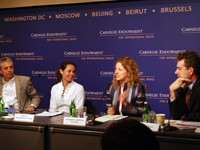Registration
You will receive an email confirming your registration.
IMGXYZ3236IMGZYXTo mark twenty years of Moldovan independence, Carnegie hosted two panel sessions featuring scholars, civil society leaders, and former and current government officials from the United States and Moldova. In the first panel, former U.S. Ambassador to Moldova Asif Chaudhry, Stephen B. Nix from the International Republican Institute, and Christopher P. Williams from the Millennium Challenge Corporation reflected on Moldova’s progress since independence, U.S.-Moldovan relations, and challenges to European integration. In the second panel, Elizabeth Worden from American University, Rebecca Chamberlain-Creanga from the London School of Economics, Vlad Spanu from the Moldova Foundation, and Cristina Batog from the Association of Moldovans in the USA (“Casa Mare”) offered their perspective on Moldovan society today. Carnegie’s Matthew Rojansky and Thomas de Waal moderated.
Since Independence
- A Success Story: Ten years ago Moldova’s accession into the EU seemed unthinkable. Since the country’s dramatic political transition in 2009, however, Moldova has implemented substantive reforms and developed a closer relationship with the EU, leading many to view Moldova as a “success story.” Among countries in transition, Moldova has shown the greatest improvement in Freedom House rankings, Batog said.
- Praise from the United States: Two senior U.S. officials – Vice President Joe Biden and Senator John McCain – have visited Moldova and praised its turn towards the West.
- Economic Development: Moldova has also experienced remarkable economic growth in recent years. According to Munteanu, Moldova’s trade has increased by 40 percent, and in 2010, 55 percent of Moldovan exports went to the EU market.
- Praise from the United States: Two senior U.S. officials – Vice President Joe Biden and Senator John McCain – have visited Moldova and praised its turn towards the West.
- Moldova Matters: Although Moldova receives little attention in the West, the small country occupies a geopolitically strategic position between the EU and post-Soviet space, Chaudhry argued. Moldova is at a crossroads – it can either continue down the path of European integration or fail to fully implement necessary reforms and lose its EU prospects. If Moldova continues to support democracy and protect human rights, “everything else will fall into place,” Chaudhry asserted.
- U.S. Interests: Ambassador Chaudhry outlined four key U.S. objectives in Moldova: the consolidation of democracy, development of a true market economy, the preservation of the Moldovan state, and European integration. Peace and security in Moldova are equally important for Europe and the United States, he argued. However, the major obstacle to political stability in Moldova is resolution of the Transnistria conflict. Chaudhry stated that the United States supports the reintegration of Transnistria into Moldova. Even as an observer in the 5+2 conflict resolution format, the United Sates plays an active role, he said. Outside the formal negotiation process, the United States has supported public diplomacy and exchange programs that bring Transnistrians to Moldova.
- Remaining Challenges: Despite important reforms, Moldova still struggles with issues such as transparency, corruption, unemployment, and human trafficking. Although Moldova received a $262 million compact from the Millennium Challenge Corporation in January 2010 to support agricultural development and road construction, Williams pointed out that domestic political will rather than foreign aid and government spending is needed to address the issues facing the country.
- Domestic Politics: While the ruling alliance in Moldova currently enjoys public support, it will likely not survive another election without addressing the sociopolitical challenges facing the nation. In addition to the need for comprehensive political reform, Spanu argued that the duality of the executive branch – with both a prime minister and a president – facilitates political in-fighting rather than effective leadership.
Moldova Today
- Moldova’s Path: Moldova’s transition to democracy has been undermined by a weak political system, economic vulnerabilities, and a lingering Soviet mentality, Spanu argued. The country still faces the threat of separatism and the presence of Russian troops in Transnistria. As Moldova continues to grow closer to the EU, it should look to Poland and the Baltic States as models of successful democratic transition, Spanu suggested.
- Role of Youth: Moldova’s younger generation has the potential to transform the country, Worden stressed. More than anyone else, Moldovan youth understand the challenges that lie ahead and have the willpower to confront them. At the same time, however, many young people are disillusioned with the current situation and have left Moldova in search of better opportunities abroad. There are simply not enough opportunities to receive a civic education and learn about democracy at home, Spanu argued. Unfortunately, the Moldovan government has little idea how to retain its most educated citizens and reverse the “brain drain,” he concluded.
- Transnistria: Chamberlain-Creanga argued that Transnistrian society is ready for change, but the government seeks to maintain the status quo. As of 2009, political divisions emerged between western-leaning “modernizers” and “militarizers” who support Igor Smirnov’s regime. She described the waning enthusiasm for Transnistrian independence and argued that the perception that Transnistria is isolated, authoritarian, and homogeneous is inaccurate. Movement between the left and right banks of the Dniestr River has actually increased. Businessmen and entrepreneurs from Transnistria are now traveling to Chisinau more often. Those who travel abroad and then return home are able to inject fresh ideas into society, she concluded.
- Identity: The recent twentieth anniversary celebrations have demonstrated that Moldovans still debate the topic of identity, Batog said. President Lupu emphasized the importance of national unity, asserting that “Moldova is not a temporary project – it is a state.” Chamberlain-Creanga added that Moldova must forge a cohesive civic identity if it hopes to reintegrate Transnistria. Munteanu disagreed, stating that the lack of a unifying national identity in Moldova does not jeopardize the existence of the state.
